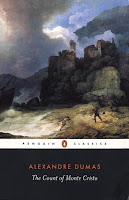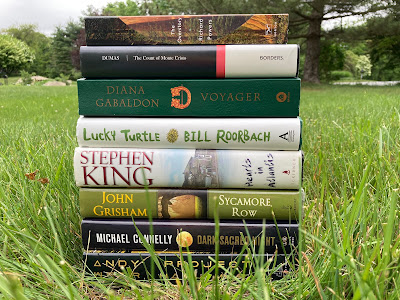In the 1930's, Tom Joad has just been released from prison, after serving his sentence for killing a man in a bar fight. He's hitchhiking and walking back to his family's farm in Oklahoma. Along the way, he meets up with Jim Casy, who used to be the preacher in his community but has given up his profession and spent a lot of time thinking about life and humanity. The two men travel together through drought-dried land back to the Joad farm, to find the small house empty and pushed off its foundation. Jim explains that this has been happening all over the area: hardworking sharecropping families have been forced off the land they've worked for years by the land owners, who have decided they can make more money with high-volume farming with machines. Jim and Tom find the rest of the Joad family, staying temporarily at Tom's uncle's house. They've decided to pack up what they can and head west to California. They've seen flyers and heard rumors that there is plenty of farm work in California, which is verdant and lush with all kinds of fruit and vegetable farms. The entire family (plus Jim)--12 people in all--pile into a homemade truck, along with cookware, mattresses, and some food, and head west on Route 66. They soon see that they are not alone; tens of thousands of other families are making the same journey, with heavy traffic westbound, and the eastbound lane mostly empty. They encounter all kinds of challenges and losses on their long trip, and once they finally arrive, they discover that California is not the Utopia they'd been led to believe. In fact, the locals make it clear they don't want the "Okies" there at all. The Joad family struggles to make a life for themselves and earn enough money to at least feed the family, but it's an ongoing challenge.
This novel blew me away--Dust Bowl pun intended! Obviously, this is a classic, so I'm not the first to notice how outstanding it is, but it greatly exceeded my expectations. Steinbeck writes so cleverly, interspersing chapters about the Joad family with chapters about all of the migrants, as an entire population, what they were experiencing, and what factors were affecting them. In this way, he's provided a very intimate, poignant story of one family--that the reader gets to know very well and care about--alongside the larger picture of what was happening in the western United States, making such drastic changes in economy and culture. He zeroes in on the path of a turtle across the dusty land of Oklahoma, focuses on the Joad family and how they made their decision to leave, and pulls out further to describe how all of the sharecropping families were forced off their land. And all of it is written in an engrossing, compelling way that completely immerses you in theses places and times. Parts of the novel are heartbreaking, but he's also woven plenty of humor into the story, too, so that the book echoes real life: the highs and lows, the challenges, and the victories and defeats. I can see why this moving, thought-provoking book is such a renowned classic, and I am still thinking about it, after finishing it last week. I only wish I could discuss it again with my high school English class and my wonderful 10th grade teacher! My husband plans to read it next.
455 pages, Penguin Classics
This book fits in the following 2023 Reading Challenges:
Mount TBR Challenge
Classics Challenge - a 20th century classic
Literary Escapes Challenge - Oklahoma
Big Book Summer Challenge
Note: This post contains affiliate links. Purchases from these links provide a small commission to me (pennies per purchase), to help offset the time I spend writing for this blog, at no extra cost to you.
Visit my YouTube Channel for more bookish fun!
Listen to a sample of the audiobook here and/or download it from Audible.
Or get this audiobook from Libro.fm and support local bookstores.
You can buy the book through Bookshop.org, where your purchase will support the indie bookstore of your choice (or all indie bookstores)--the convenience of shopping online while still buying local!









